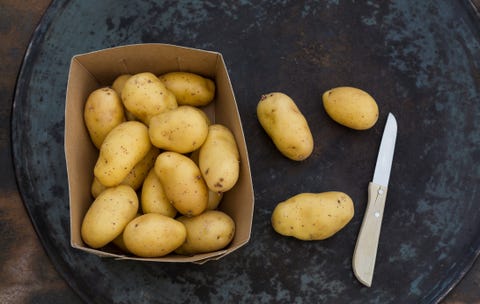These 4 Factors Could Drastically Help You Lose Weight
Brian St. Pierre, M.S., R.D., C.S.C.S., is a member of the Men’s Health Advisory Board.
Weight loss can feel like a moving target. What works one month doesn’t seem to work another month and stepping on the scale can often feel like a game of roulette.
At Precision Nutrition, where I work as a Nutrition Director, I frequently see clients who are frustrated and, at times, mystified by why they’re not losing weight.
I often try to tell them that weight loss is way more complex than trendy diets lead you to believe. There are all sorts factors that contribute to losing weight that include, but are not limited to sleep, exercise, genes, body composition, age, gender, diet, hydration, stress, mindset, outlook, and probably 14 other things I’m currently forgetting.
But just because weight loss is complex doesn’t mean it has to be difficult. In fact, most of the work I do with clients involves them simplifying their approach to diet and exercise.
For instance, here are four examples of simple steps you can take to dramatically improve your odds of building the body you want.
1. Focus on Fullness

Getty Images
Feeling hungry and deprived is a significant challenge for most people on a diet. But it doesn’t have to be that way. In fact, it shouldn’t.
The best way to do that? Eat a diet rich in varied protein (eggs, fish, lean meats), vegetables and fruits, healthy fats (olive oil, avocado, nuts), and quality carbohydrates (potatoes, sweet potatoes, whole grains, beans and legumes). This approach provides you with the nutrients you need to feel more satisfied from fewer calories.
Naturally, because you feel full, you’ll move away from highly-rewarding foods that don’t provide much satiety despite their high calorie content: pastries, donuts, pizza, fried foods, ice cream, etc.
2. Dismantle the Carb Pedestal

Getty Images
Research certainly supports the use of a well-thought-out, low-carb diet for fat loss. However, research also supports several other well-thought-out diets for fat loss (low-fat, Mediterranean, plant-based, etc.).
There isn’t anything inherently magical to low-carb. What is magical is finding an intake that you enjoy and can comfortably follow. Because what research shows, and what our experience coaching more than 100,000 people confirms, is that consistently being able to follow an eating style is the biggest factor in reaching your goals.
“Low-carb” is also a somewhat subjective statement. For keto purposes, “low” usually means less than 50 or even 30 grams of carbohydrates. For approaches that are a little less drastic, 130 grams is often the target number. Even then, what’s “low” for a 160-lb., relatively sedentary man will be different for what’s “low” for a highly active 230-pound man.
Generally, we prefer not to have your clients count grams or calories. If your goal is to aim for a more ketogenic intake, you would eliminate all starchy carbs (e.g. grains, potatoes, beans, etc.), all sugary items (e.g. juice, soda, sports drinks, etc.) and all fruit. If you’re aiming for that less-restrictive 130-gram target, you would still eliminate all sugary items, but allow for 2 to 3 total handfuls per day of starchy carbs and/or fruits.
3. Don’t Let Booze Sink You

Getty Images
Calories from alcohol play a significant role in weight management. There are about 110 to 150 calories in most standard servings of alcohol. But craft beers, which are ever more popular, can sometimes cross the 200-calorie-per-beer threshold. Toss back a few of those with dinner and you’ve added 400-plus calories to your meal.
The back way to cut back your intake is slowly. Dial it back by drink per day, or every other day. Do keep in mind, that for many people, alcohol is a way to unwind. So it also helps to work on other coping skills and stress management strategies—things like meditation, yoga, taking short walks, getting outside, playing with your pet, or whatever makes you happy. Building these skills often makes it significantly easier to decrease alcohol intake without feeling like you’re depriving yourself.
4. Have Some Fun in the Kitchen

Getty Images
Shopping and cooking for yourself and your family is one of the best things you can do for your overall health right now. If you hate cooking, try to problem-solve why.
Strategize ways to involve more fun. Incorporate the family. Aim for relatively simple meals. Put on some music. The key is to not overwhelm yourself, or to try to bite off more than you can chew. Find what you already do well and start there.
Then as your comfort level grows, look to push the boundaries of that comfort zone bit by bit, and slowly expand your knowledge and skills until you reach a point you are content with.
Source: Read Full Article


